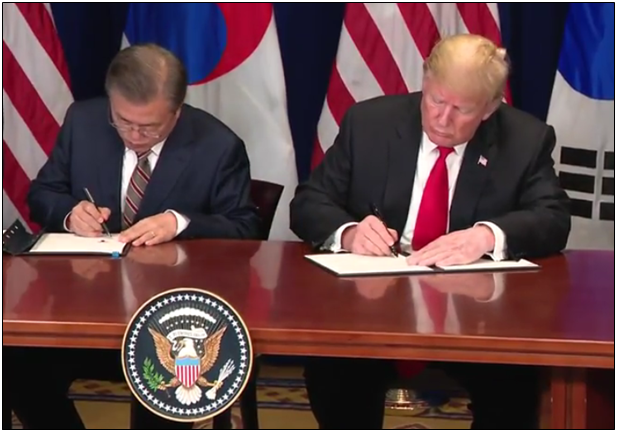The naysayers said it couldn’t be done. That by levying his steel and aluminum tariffs, President Donald Trump would be starting a trade war that could not be won. Instead, it is Trump who has been vindicated with his new trade agreement with South Korea, which proves that the threat of tariffs can be used to get a better deal for the American people.
In exchange for an exemption from the 25 percent steel tariff but not the 10 percent aluminum tariff, South Korea agreed to stop dumping steel into the U.S. at a 70 percent quota of its current shipments.
In addition, according to the Office of the U.S. Trade Representative, the phase out of the 25 percent U.S. tariff on trucks will be extended to 2041 from the current phase out that was set for 2021.
U.S. auto exports will be eased by the new agreement, according to the USTR website: “Korea will double the number of U.S. automobile exports, to 50,000 cars per manufacturer per year that can meet U.S. safety standards (in lieu of Korean standards) and enter the Korean market without further modification.”
In addition, U.S. gasoline engine vehicles will be able to pass South Korean emission standards “using the same tests they conduct to show compliance with U.S. regulations, without additional or duplicative testing for the Korean market” and South Korea will “recognize U.S. standards for auto parts necessary to service U.S. vehicles, and reduce labeling burdens for parts.”
On fuel economy, South Korea also agreed to expand the amount of eco-credits available and will in the future be set “taking U.S. regulations into account and will continue to include more lenient targets for manufacturers that sell small volumes of cars in Korea.”
On customs, the U.S. Trade Representative reports, costly verification procedures will be reduced by “conducting verification of origin of exports under KORUS and establish a working group to monitor and address future issues that arise.”
Finally, on pharmaceuticals, South Korea agreed to stop discriminatory treatment of U.S. pharmaceutical exports under its Premium Pricing Policy for Global Innovative Drugs, affirming a key aspect of the Korean-U.S. Free Trade Agreement.
These concessions begin to add up, and they show that it not only okay for President Trump to use tariffs as a negotiating position, but can be advantageous for all parties, producing a resolution that has more free trade, but also fairer and more reciprocal trade, just like the President promised.
And it’s not a moment too soon. Since the U.S.-Korean Free Trade Agreement went into effect, the trade deficit between the two economies has jumped by 75 percent, from $13 billion to $23 billion.
In announcing the new agreement, President Trump declared, “The new U.S.-Korea agreement includes significant improvements to reduce our trade deficit and to expand opportunities to export American products to South Korea. In other words, we are now going to start sending products to South Korea.”
Trump hailed the benefits for U.S. exporters, adding, “These outcomes give the finest American-made automobiles, innovative medicines, and agricultural crops much better access to Korean markets.”
And none of it would have happened without a President dedicated to the details of these trade deals. Trump, standing side-by-side with South Korean President Moon Jae-In, said a new era had begun on U.S. trade: “From day one, I promised the American people that I would renegotiate our trade deals to ensure that our agreements were fair and reciprocal. For decades, politicians have talked about fixing broken trade deals only to do absolutely nothing about them. My administration is the first to actually keep our promise and deliver. And in addition to this deal, we have many in the works, and they’re fair deals. They’re reciprocal deals. And they make a tremendous difference to our workers, our companies, and to the United States as a whole.”
Fair and reciprocal trade, just like Trump promised. And for millions of Americans in the Rust Belt and across the heartland who voted for President Trump, they’re saying it’s about time.
Robert Romano is the Vice President of Public Policy at Americans for Limited Government.







